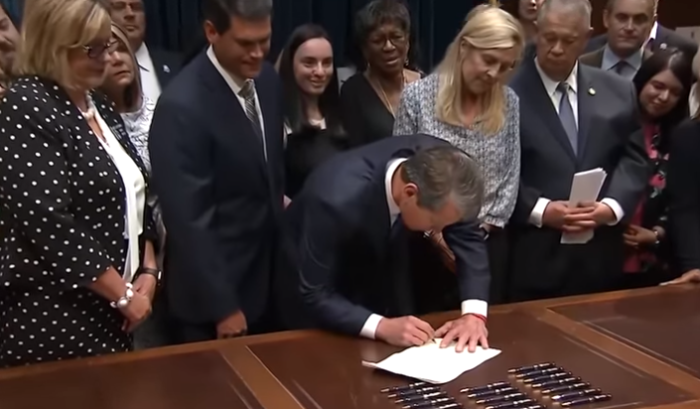Georgia bans abortion after heartbeat is detected, recognizes fetus as natural person

Georgia Gov. Brian Kemp angered abortion supporters Tuesday when he signed a bill into law that bans abortion once a fetal heartbeat has been detected and recognizes fetuses as natural persons.
"Georgia is a state that values life," Kemp said as he signed HB 481, also known as The Living Infants Fairness and Equality Act, into law. "We protect the innocent, we champion the vulnerable, we stand up and speak for those that are unable to speak for themselves."
Republican State Rep. Ed Setzler, who also spoke at the bill signing, called the legislation a "common sense issue," saying that a preschooler would recognize a fetus as a baby.
“The Living Infants Fairness and Equality Act is a bill that recognizes something that many have known for years. It recognizes that science tells us that children in the womb are living distinct human beings that are worthy of full legal protection. It recognizes what law tells us. We follow the dictates of solid law in the foundations that even our United States Supreme Court has said that if any recognizes the personhood of a child in utero that life gets full protection of our federal Constitution and that’s what the Living Infants Fairness and Equality Act does today,” he said.
“And finally, common sense tells us, if you look at a child in the womb, with a beating heart, with a distinct blood type and you ask a preschooler, a small child, what are you looking at, they would look and say ‘that’s a baby.’ When you recognize what science, law and common sense tells us today, that those in utero in Georgia, with a human heartbeat, with a full circulatory system, and all the components of humanity should get full protections of our laws. It’s on that foundation that we stand today.”
The move also drew support from pro-life supporters such as Live Action founder and President Lila Rose.
“This is a huge win for life. Georgia is the fourth state this year to pass a heartbeat bill, joining Kentucky, Mississippi, and Ohio. This law acknowledges the scientific fact that the pro-abortion movement tries desperately to ignore: This is a unique, individual human life in the womb, not a ‘clump of cells;’ and just three weeks after fertilization, the child’s little heart is already beating. It’s time for society and our laws to acknowledge that there are two human beings in a pregnancy - a baby and his or her mother - and both deserve protection,” Rose said in a statement to The Christian Post.
Popular Rep. Alexandria Ocasio-Cortez, D-N.Y., lashed out at the legislation on Tuesday, calling it a “backdoor ban” on abortion.
“’6 weeks pregnant’ = 2 weeks late on your period. Most of the men writing these bills don’t know the first thing about a woman’s body outside of the things they want from it. It’s relatively common for a woman to have a late period + not be pregnant. So this is a backdoor ban,” she wrote on Twitter.
“For context, this kicks in within days of a typical at-home test working. If you were sexually assaulted (stress delays cycle), took a morning-after pill (throws off cycle), or have an irregular cycle, you‘d have no idea. There are a TON of ways this law ignores basic biology,” she added.
In a direct response to Ocasio-Cortez, Rose said: “I don’t think you understand how these bills work. They ban abortion after the baby’s heartbeat can be heard by ultrasound, which is around 6 wks. Also, a lot of women support these life-saving laws, myself included. You should join us. Glad some of ‘the men’ are on board, too.”
The American Civil Liberties Union and the Center for Reproductive Rights have promised to challenge the legislation long before it goes into effect in January 2020. Abortion advocates believe the legislation violates the landmark 1973 Supreme Court Roe v. Wade decision which protects a woman's right to an abortion up until when the fetus is viable, which typically happens between 24 and 25 weeks.
"This law is bafflingly unconstitutional," Elisabeth Smith, chief counsel at the Center for Reproductive Rights told CBS News. "Bans like this have always been blocked by courts. We will be suing Georgia to make sure this law has the same fate."





























